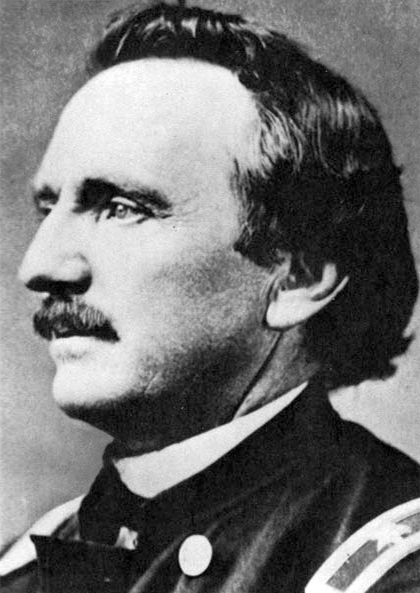William Raynolds
| William F. Raynolds | |
|---|---|

William F. Raynolds in brevet brigadier general uniform
|
|
| Born | March 17, 1820 Canton, Ohio |
| Died | October 18, 1894 (aged 74) Detroit, Michigan |
| Allegiance |
|
| Service/branch |
|
| Years of service | 1843–1884 |
| Rank |
|
| Unit |
Corps of Engineers Corps of Topographical Engineers |
| Battles/wars |
Mexican-American War American Civil War |
William Franklin Raynolds (March 17, 1820 – October 18, 1894) was an explorer, engineer and U.S. army officer who served in the Mexican-American War and American Civil War. He is best known for leading the 1859–60 Raynolds Expedition while serving as a member of the U.S. Army Corps of Topographical Engineers.
During the 1850s and again after his participation in the American Civil War, Raynolds was the head engineer on numerous lighthouse construction projects. He oversaw riverway and harbor dredging projects intended to improve accessibility and navigation for shipping. As a cartographer, Raynolds surveyed and mapped the islands and shorelines on the Great Lakes and other regions. At least six lighthouses whose construction he oversaw are still standing. Some are still in use and of these, several are listed on the National Register of Historic Places.
In 1848, during the American occupation of Mexico after the Mexican-American War, Raynolds and other U.S. Army personnel were the first confirmed to have reached the summit Pico de Orizaba, the tallest mountain in Mexico, and inadvertently set what may have been a 50-year American alpine altitude record. In 1859, Raynolds was placed in charge of the first government-sponsored expedition to venture into the upper Yellowstone region that was later to become Yellowstone National Park. Heavy winter snowpack in the Absaroka Range of Wyoming prevented the expedition from reaching the Yellowstone Plateau, forcing them to divert to the south and cross Union Pass at the northern end of the Wind River Range. After negotiating the pass the expedition entered Jackson Hole and surveyed the Teton Range, now within Grand Teton National Park.
...
Wikipedia
